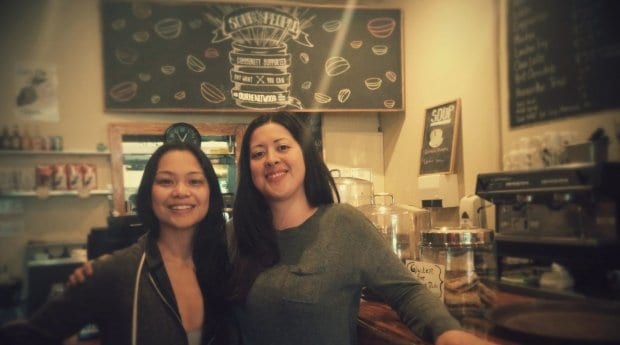As I push open the door to the Heartwood Community Café on East Broadway Street, I’m greeted by the smell of coffee and fresh fruit, the warmth of wood floors in an open, high-ceilinged space, and the strains of Lorde, Alanis Morissette and Imagine Dragons.
The café sits in the space once occupied by Rhizome Café, whose owners Lisa Moore and Vinetta Lenavat decided to sell in 2013 after seven years as a beloved community space and social justice hub.
Though Moore and Lenavat remained deeply committed to the community space they’d nurtured, Moore told Daily Xtra in 2011 that the global economic downturn, combined with rising rent and food costs, had put a strain on the café’s financial viability.
Moore said she was moved by the community support Rhizome received from patrons and donors but in the end the stress of staying afloat while staying true to the café’s values proved too great.
“We were so overwhelmed by the support we got — the number of people who were willing to donate what they were able to, when they were able to, to continue this thing that they considered their home and shared resource that they were committed to, and that has really been beautiful,” she told Daily Xtra in April 2013.
“The beautiful thing is that we’re ending while Rhizome is still very strong and still is very vibrant and still everything we hoped it would be, and more,” she added.
Five months after Moore and Lenavat announced Rhizome would be closing, Trinity United Church purchased and re-opened the café under new management, determined to honour its roots as a social justice hub and queer community space.
“It was a natural progression,” says Ana-Luz Cobon, Heartwood’s general manager. “Some of our colours were inherited from Rhizome Café. There was a sense of wanting to keep some familiarity, but also bring something new.”
Melanie Matining, Heartwood’s community development manager, nods her head in agreement. “We wanted to create a space that nourishes the spirit of social justice and liberation,” she says.
But maintaining a balance between Heartwood’s commitment to being an intentional community space — built on its core values of social justice and community building — and remaining viable as a business isn’t easy.
“So much of what we’re doing here is based on vision,” Matining says. “The reason why people come is for vision and the way it plays out, and the way we make food, and the way we hold events.”
“There are ways to build and help community,” Cobon says. She cites a few examples: “We want to bring good quality ingredients, we want to connect with community organizations and support fair-trade coffee and local companies, and also support the community by hiring people that are involved in the queer community or as allies who can offer their skills in the workplace.”
Heartwood also invites a variety of social justice, community groups and artists to meet in its space, and any given night could find a book launch, a queer talent show, a performance by an indie band, an art exhibit or a community fundraiser. And that’s just a sample of the events already scheduled for April.
But sustaining queer community spaces in Vancouver is a challenge. Many spaces have had to close or change business models to remain viable. Heartwood’s location, outside Vancouver’s well-known queer neighbourhoods on Davie Street and Commercial Drive, presents an additional challenge.
“We’re really thinking: are we able to stay open?” Matining says. Already, the café has had to scale back its hours. It’s now closed on Mondays and only open until 3pm on Sundays.
“Starting in March, Heartwood Community Café will be changing our hours of operation,” says a notice on the café’s website. “In our pursuit of finding a balance between financial sustainability and continuing to stay open as a community space, we made the hard decision of reducing our regular hours . . .”
Paige Frewer runs East Vancouver’s popular monthly drag-king party Man Up. Among the changes in queer business models she has noticed over the years has been a shift among some queer organizers to host their events in mixed rather than queer venues. This raises new questions of which community members will attend events in mixed spaces, how they identify, how they intermingle and where they spend their money, Frewer says.
Frewer used to bartend at Lick, Vancouver’s lesbian bar, before it closed in March 2011 after nearly eight years in business. Lick closed after the owners of the building in which it was located at 455 Abbott St in Gastown sold the building.
“Some historically queer neighbourhoods are far too expensive,” Frewer notes. “Not only for many queers to live in, but also for business owners to run a bar in.”
Pat Hogan, who opened Josephine’s Cappuccino Bar and Wimmin’s Crafts on Charles Street just off Commercial Drive in the early 1990s, remembers the challenges of keeping the café financially afloat.
“It became a very popular place for all sorts of people in the community, but particularly for lesbians,” she says. “Like any small business, it needs a lot of financial backing to work. It was enough to open up and keep it going, but there wasn’t really enough for the changes that were needed.”
Josephine’s closed in 1994, after just two years in business. Hogan couldn’t afford the changes she needed to make to the interior, not to mention the long hours required to run the café.
Celebrities, one of Vancouver’s half-dozen remaining gay clubs, has continued to thrive by adjusting its business model. “Twenty years ago, Celebrities was a gay space seven days a week,” manager James Steck explains in a phone interview. “But we had to compromise in order to stay open.”
Now, in addition to its popular gay nights, Celebrities also offers regular nights for straight patrons.
Steck calls upon “gay promoters who are doing events in non-gay bars” to bring their events back to gay establishments in the Davie Village.
“The landscape of queer space has been shifting,” Frewer says. “Many organizers moved towards renting underground or DIY spaces, warehouses and art galleries to do events. I think it’s an interesting phenomenon that, in part, is adding to the scarcity of queer spaces.”
Financial backing, city support and possibly working as a cooperative are ways to keep queer spaces open and viable, Hogan suggests — “if people support it.”
Matining and Cobon believe the Heartwood Café can earn that community support. People share their social justice values and want to support the space, they say. “The more accessible we can be, the more people come in, the more people trust us, and continue to tell their friends — that’s how we can thrive as a community, and how we thrive as a business,” Matining says.
The Heartwood Community Café is located at 317 Broadway E St.


 Why you can trust Xtra
Why you can trust Xtra


